Corby Pole Fair: The ancient celebration held once every 20 years
- Published
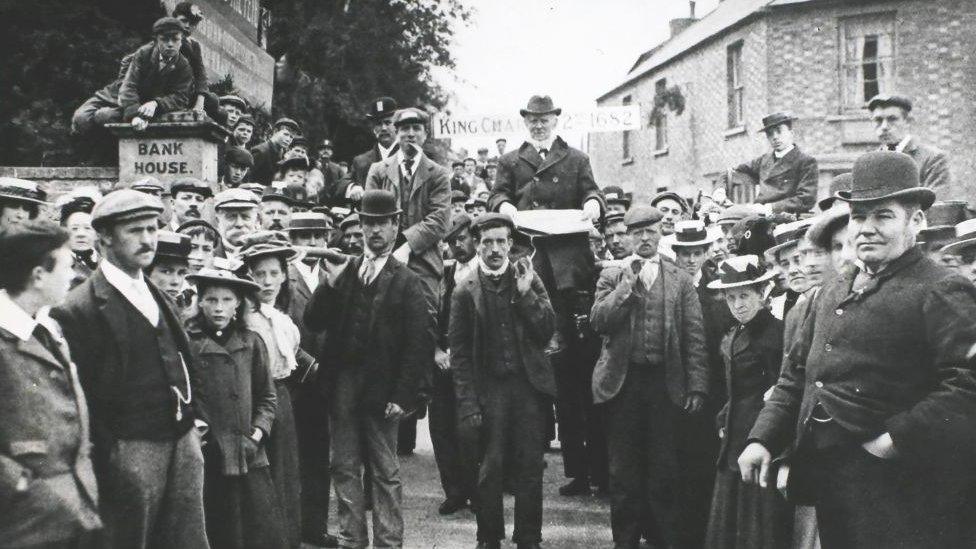
Men carrying the chairman of the council, who is holding the town's charter, on a chair attached to poles at the 1902 Corby Pole Fair
Nobody seems quite sure when the first Corby Pole Fair was held.
Some say it goes back to the 13th Century, some to 1585 when Queen Elizabeth I was rescued from a bog by Corby villagers and others to the 17th Century when Charles II granted the town a charter.
What is known, however, is that the town's Pole Fair - which takes place on Friday - includes eager participants clambering up a greasy pole to get a ham and town dignitaries being wafted on chairs and then placed in stocks unless they pay a "toll".
The most unusual aspect of the fair, however, is its timing: It takes place once every 20 years.
Why every two decades?

Paul Balmer says the history of the Corby Pole Fair is fascinating
Nobody is quite sure, says Corby resident Paul Balmer, who was last year commissioned to make a film about the Pole Fair, external.
Like others in the town, Mr Balmer is not sure about when the first fair took place.
"It depends who you listen to and who you read. It may go back to 1226 when the first fair was granted by Henry III," he says.
"Generally when we're celebrating the Pole Fair we talk about 1585 which is when Queen Elizabeth apparently came here and got stuck in a bog and was rescued by Corby villagers and she rewarded them with a charter.
"That's one of the legends, there are many legends," he says.
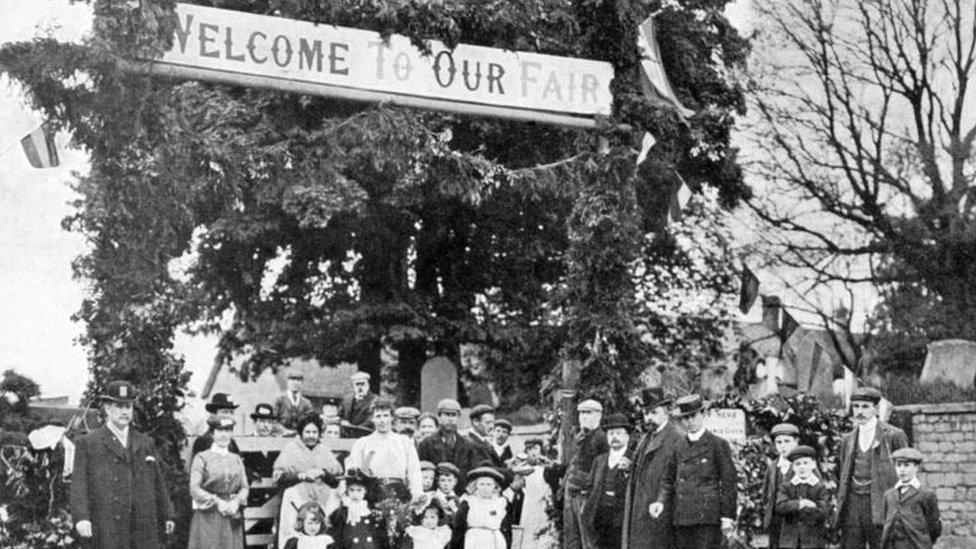
The 1902 fair was held in the village of Corby, which is now known as Corby Old Village
The 70-year-old says he looked for that charter, could not find it but found the later charter which dates from "1670 or 1682 depending on who you listen to".
"That was awarded by Charles II and that's the Pole Fair we are celebrating now."
Mr Balmer says nobody "is totally sure" why it is called the Pole Fair.
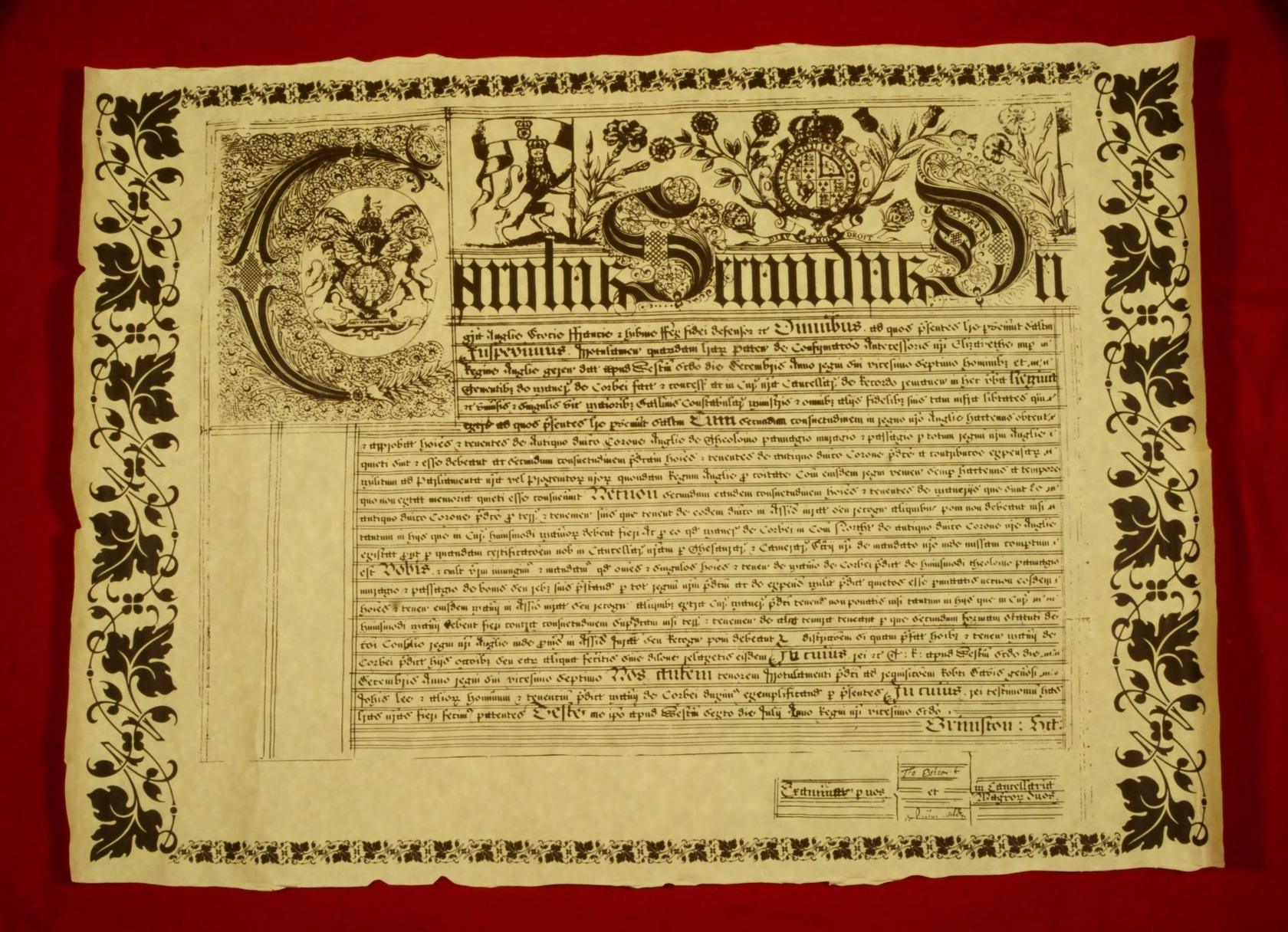
The charter was given to Corby by Charles II in the late 1600s
He says there is the Viking tradition of "riding the stang", which he says meant "if you didn't pay your toll you were carried on the 'stang' to the stocks and had to pay a penny to get out but the villagers, because of the charter, were exempt from the toll".
"Then there's the greasy pole, which is most probably associated with the ox roast," he says.
"The lord of the manor often gives an ox to villagers when they are celebrating a fair or a big occasion, the grease from the ox is put on a pole with a ham on the top and if you climb the greasy pole you get to keep it."
This year there will not be a greasy pole to climb because the event's organisers could not get the challenge insured. Instead, a ceremonial pole will be put up.

A short guide to Corby

Ryan Bruce - aka RB Capone - was having lunch one day and wondered whether anybody had ever written a song about Corby
Despite being named in the Domesday Book and receiving a Royal Charter from Queen Elizabeth I, Corby is also (since 1950) designated a 'new town'
Although it sits right in the middle of England, it is known locally as 'Little Scotland' because of the many thousands of Scots who migrated south to work in the steelworks in the 1930s
The town was devastated in 1980 when thousands of people lost their jobs when the works closed.
Today's Corby is home to more than 50,000 people and is among England's most deprived areas
The town is home to rapper RB Capone whose song "Small Town (01536)" is described as a "love letter to Corby

Those held aloft on chairs during the fair are the church rector, the chairman of the council and the oldest person known to be born in Corby.
The bells of the old parish church chime out to wake all the villagers for the celebrations.
After the charter is read out at the three entrances to the village, now known as Corby Old Village, the trio on chairs are taken to the stocks.
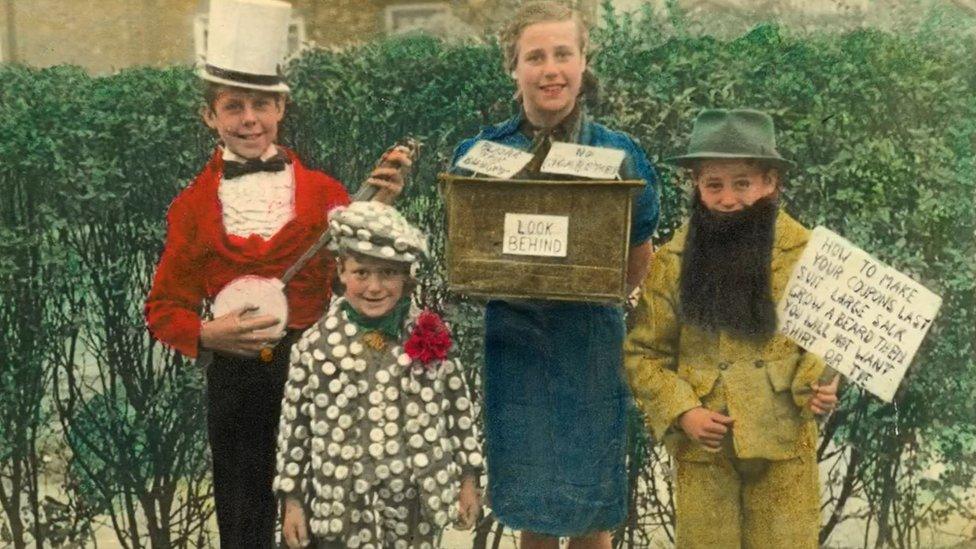
Cyril Sellars (left) and his brother Dennis (second left) entered the fancy dress competition at the 1947 Pole Fair. Dennis won first prize
In 1942 Corby had no fair because of World War Two. It was held instead five years later.
One of those who remembers the 1947 fair is Cyril Sellars, who was 11 years old at the time.
"[It was] the transition from a plain, boring, life that followed the depression and the war - we were children with nothing.
"Everything was plain and not colourful, when my father took it upon himself to enter us into the 1947 Pole Fair it was such an excitement.
"He designed costumes and him and my elder sister made them and then dressed us in colour, it was astounding to an 11-year-old.
"Suddenly it was carnival, people dressed in sorts of costumes, and music and parades, it became an open door."

Cyril Sellars has been to every Corby Pole Fair since 1947
The 86-year-old says the reading of the charter had him "mesmerised".
"This was real history and you were there hearing it, I stood there with an open mouth taking it all in."
Another of his favourite traditions was the greasy pole.
Mr Sellars says: "You loved competition, when you saw youths climbing this thing it looks as though they would get to top and they would come back down and everybody would cheers them on, you loved that.
"The music, the bands, it was fantastic.
"I can't tell you how much we were overwhelmed by each aspect of it, it was something we had never experienced."
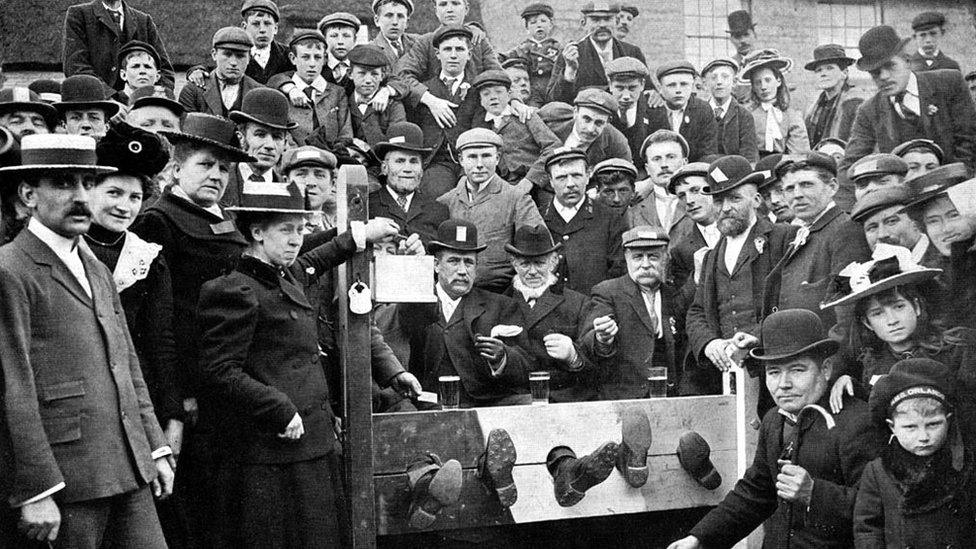
The stocks at the Corby Pole Fair for those who refused to pay the "toll" at the 1902 fair
Some 15 years later in 1962, an 11-year-old Denise Westwood was about to experience her first fair.
"Neither of my parents were from here so they weren't aware of the tradition," she says.
Instead she was taken to the fair by her head teacher who lived opposite her.
"During the day there were so many things happening, but it was just such fun.
"You knew people, the people who did the ox roast, they were the council workers, they were our dustbin men, it was all very much a community thing."
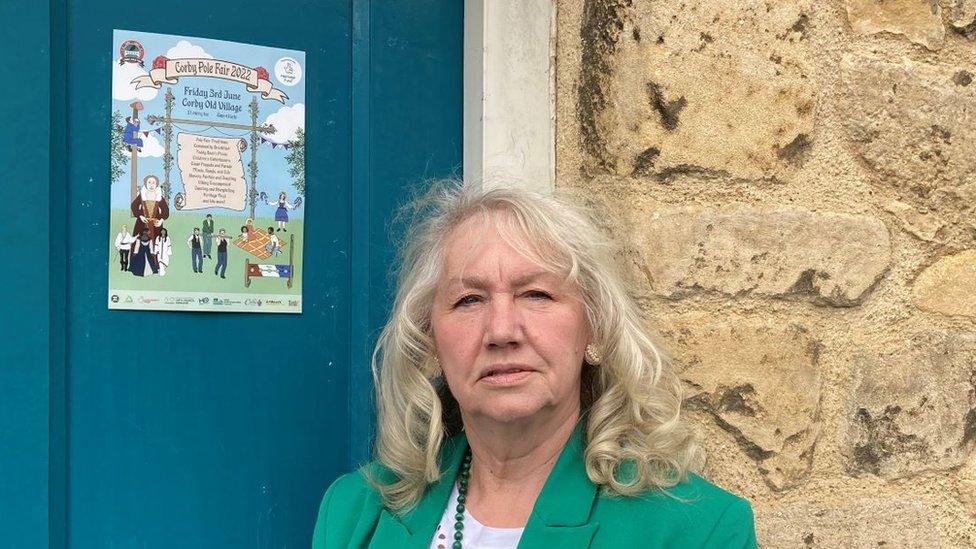
Denise Westwood hopes this year's Pole Fair will inspire a new generation to get involved in the next event
This year Ms Westwood chairs the Pole Fair committee, which has received two Heritage Lottery Fund grants worth almost £200,000.
She says when they told the fund the fair was only held every 20 years "they were so excited" and were keen to help.
"That 20 years means a lot to me, I'm glad it's not every year.
"There is such a difference in your age and attitude that it marks it and I love that part of it."
Thinking back to 1962, she says: "I remember really clearly thinking '20 years I'll be so old, I'll be 31', it just seemed such a long time.
"And then when the next one came I brought my children, and then in 2002 I came with my grandchildren.
"I've got eight great grandchildren and I'm bringing them this time and if I'm still here in the next one I might be bringing my great great grandchildren."

Find BBC News: East of England on Facebook, external, Instagram, external and Twitter, external. If you have a story suggestion email eastofenglandnews@bbc.co.uk, external